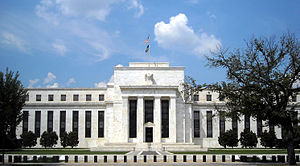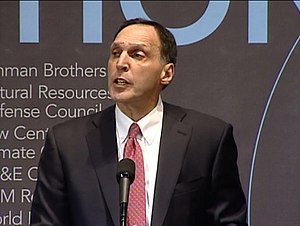
Image via Wikipedia
By Stephen Roach
America’s fixation on the “China problem” is now boiling over. From Google to the renminbi, China is being blamed for all that ails the US. Unfortunately, this reflects a potentially lethal combination of political scapegoating and bad economics.
The political pressures are grounded in the angst of American workers. After more than a decade of stagnant real compensation and, more recently, a sharp upsurge in unemployment, US labour is being squeezed as never before. Understandably, voters want answers. It is all because of the trade deficit, they are told – a visible manifestation of a major loss of production to foreign competition. With China and its so-called manipulated currency having accounted for fully 39 per cent of the US trade deficit in 2008-09, Washington maintains that American workers can only benefit if it gets tough with Beijing.
However appealing this argument may seem, it is premised on bad economics. In 2008-09, the US had trade deficits with more than 90 countries. That means it has a multilateral trade deficit. Yet aided and abetted by some of America’s most renowned economists, Washington now advocates a bilateral fix – either a sharp revaluation of the renminbi or broad-based tariffs on Chinese imports.
A bilateral remedy for a multilateral problem is like rearranging the deckchairs on the Titanic. Unless the problems that have given rise to the multilateral trade deficit are addressed, bilateral intervention would simply shift the Chinese portion of America’s international imbalance to someone else. That “someone” would most likely be a higher-cost producer – in effect, squeezing the purchasing power of hard-pressed US consumers.
![Reblog this post [with Zemanta]](http://img.zemanta.com/reblog_e.png?x-id=bffc7bcf-30bf-438a-ac06-d293db88ecb9)


![Reblog this post [with Zemanta]](http://img.zemanta.com/reblog_a.png?x-id=fd535741-b167-4ba2-a172-b175ba962ff2)


![Reblog this post [with Zemanta]](http://img.zemanta.com/reblog_a.png?x-id=980de94e-beca-4b06-bc8c-264a11cb89d6)



![Reblog this post [with Zemanta]](http://img.zemanta.com/reblog_e.png?x-id=aaecaa14-54e2-4743-8e37-49b01cf751e3)


![Reblog this post [with Zemanta]](http://img.zemanta.com/reblog_a.png?x-id=7a8e5563-fd63-4af4-8c2a-a17c9a2791b4)



![Reblog this post [with Zemanta]](http://img.zemanta.com/reblog_a.png?x-id=641fcd93-c9d0-4186-8a63-f1429be7426d)

![Reblog this post [with Zemanta]](http://img.zemanta.com/reblog_a.png?x-id=882c29bd-23f6-485c-8c84-a20a757fcf16)

![Reblog this post [with Zemanta]](http://img.zemanta.com/reblog_a.png?x-id=ac03972a-d94a-4005-8995-71eec3bed672)


![Reblog this post [with Zemanta]](http://img.zemanta.com/reblog_a.png?x-id=55b131c4-0a59-43e6-88f0-e2781e5c7163)

![Reblog this post [with Zemanta]](http://img.zemanta.com/reblog_a.png?x-id=595565f5-b33e-4718-b568-9a06bd54eb40)

![Reblog this post [with Zemanta]](http://img.zemanta.com/reblog_a.png?x-id=b6659bf6-fbe1-4328-bef0-a68a7ea8f5c7)

![Reblog this post [with Zemanta]](http://img.zemanta.com/reblog_e.png?x-id=2336e3ec-d770-4a5c-b6e7-faa8032b1ebb)

